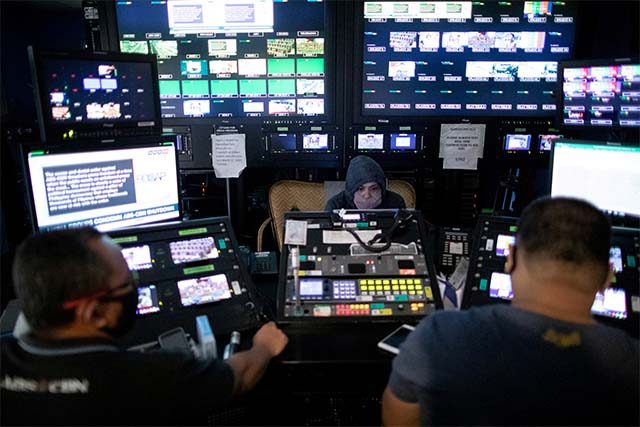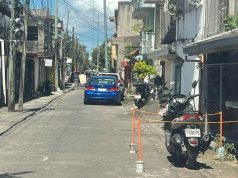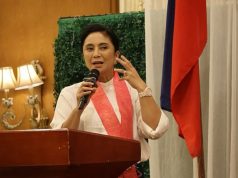
(Updated 8:05 p.m.) Filipinos who watched President Rodrigo Duterte‘s televised address on Tuesday evening demanded local news outlets to observe the same treatment on the coverage of US national elections.
In his recorded address and briefing with Cabinet officials, Duterte spent nearly 20 minutes ranting and accusing Vice President Leni Robredo of spreading lies that he’s asleep and missing in action during the onslaught of the recent typhoons.
“I was here, dito. I was attending a summit — ASEAN Summit ‘yon. So virtual lang palit-palit kami, we were talking sa electronic. Nandito ako noon,” he said.
Typhoon Ulysses first made landfall in Patnanungan, Quezon late November 11.
Robredo, however, never asked the president’s absence in her social media updates, interviews and public appearances.
Duterte also accused the vice president of grandstanding during her official visits to typhoon victims. He also threw vague remarks at her whereabouts every night, and asserted that she’s merely making calls to the military.
How to report falsehood-laden speeches
While the recorded speech was ongoing, some local reporters were quick to point this out and fact-checked Duterte’s remarks against Robredo.
News correspondent Barnaby Lo recalled the lessons during the coverage of US polls.
“Guys, sabi niyo when US networks stopped airing Trump mid-speech because he was lying, ‘SANA ALL.’ You didn’t do it when you had to tonight. So now, at the very least, don’t mince, report lies as lies,” Lo wrote.
Guys, sabi niyo when US networks stopped airing Trump mid-speech because he was lying, “SANA ALL.”
You didn’t do it when you had to tonight.
So now, at the very least, don’t mince, report lies as lies.
— Barnaby Lo (@barnabychuck) November 17, 2020
Major networks in the United States that carried or live-streamed Donald Trump’s press briefing immediately interrupted or dropped their coverage to provide context on Trump’s false remarks. These include USA Today, MSNBC and ABC News.
READ: Lessons from coverage of US polls: Can Philippine media interrupt live speeches to fact-check?
Such decision earned praises from local journalists and pundits. Some of them hoped to observe the same practice to government officials’ speeches here.
This time, while some networks succeeded in performing the same gesture, it raised a discussion on how should they treat similar false-laden statements in their coverage moving forward.
GMA reporter Atom Araullo noted that live-tweeting events, briefings and speeches has been an industry practice for a long time.
“Should we reconsider the practice of live tweeting the president’s speeches (or any official for that matter) if we cannot fact-check his statements on the spot? It has become industry practice, but we might have to reimagine our coverage in the age of mis/disinformation,” Araullo wrote.
So should we reconsider the practice of live tweeting the president’s speeches (or any official for that matter) if we cannot fact-check his statements on the spot? It has become industry practice, but we might have to reimagine our coverage in the age of mis/disinformation.
— Atom Araullo (@atomaraullo) November 18, 2020
Another journalist Llanesca Panti reminded her colleagues that not all statements must be shared to the public.
ABS-CBN news editor Tarra Quismundo, meanwhile, urged Twitter to flag false quotes of presidents other than Trump.
Hey @Twitter, please start flagging lies of Presidents other than Donald Trump.
— Tarra Quismundo 🇵🇭 (@TarraQuismundo) November 17, 2020
On the eve of US elections early this month, Twitter and Facebook flagged false posts by Trump.
It hid the US president’s tweet behind a label which said the content was “disputed” and “might be misleading.”
Meanwhile, news editor Felipe Salvosa argued that it’s about time to stop or lessen the practice on “neutral reporting.”
“Journalists need to be weaned off the old standard of cold and neutral reporting, which has been hijacked by purveyors of falsehoods in the officialdom who used to have guaranteed spots in the news,” Salvosa said.
Journalists need to be weaned off the old standard of cold and neutral reporting, which has been hijacked by purveyors of falsehoods in the officialdom who used to have guaranteed spots in the news.
— Felipe Salvosa II⁷ (@felipesalvosa) November 17, 2020
Blogger Tonyo Cruz also suggested to provide commentaries on government briefings instead of just carrying them for free.
“If media outlets choose to carry the RTVM feeds, there should be annotation, commentary and corrections to the feeds, which many see as vehicles for partisan propaganda, disinformation, and misinformation,” Cruz said.
RTVM already has PTV and the PCOO network to do its dirty work for them.
If media outlets choose to carry the RTVM feeds, there should be annotation, commentary and corrections to the feeds, which many see as vehicles for partisan propaganda, disinformation, and misinformation.
— Tonyo Cruz (@tonyocruz) November 17, 2020









